Hello everyone! Today, I want to share my honest thoughts on Yalca Fruit Trees, a well-known supplier of fruit trees in Yalca. As an avid gardener, I’m always looking for the best fruit trees to plant in my backyard, and Yalca Fruit Trees has been my go-to nursery for all my fruit tree needs.
What sets Yalca Fruit Trees apart is their wide variety of fruit tree varieties. Whether you’re looking for apple, pear, peach, or citrus trees, they have it all. Their collection is extensive, and each tree is carefully cultivated to ensure top-notch quality.
Key Takeaways:
- Yalca Fruit Trees offers a wide variety of high-quality fruit tree varieties in Yalca.
- Their nursery provides expert guidance on planting, care, and maintenance.
- The trees at Yalca Fruit Trees are healthy, vibrant, and produce bountiful harvests.
- Yalca Fruit Trees is the go-to source for anyone interested in creating a fruit orchard.
- Experience the joy of growing your own fruit with Yalca Fruit Trees.
Finding the Perfect Peach Tree
Are you in search of the perfect clingstone peach tree? Look no further! One customer, Lilian, is on a mission to find a specific clingstone peach tree that she used to have. She vividly describes the peach as having yellow flesh with red mottling and recalls purchasing it from a Woolies store back in the 1970s.
Through her search, Lilian has come across a suggestion for the Abiacuto clingstone peach variety, which matches the description of her beloved peach. However, she is unsure where to find it.
If you are facing a similar dilemma or seeking specific peach tree varieties, there are a few avenues you can explore. Our community of fruit enthusiasts has shared some helpful tips:
- Check old fruit growing books: These publications often contain valuable information about various peach tree varieties, including clingstone peaches. Look for books focused on stonefruits, as they are more likely to feature the specific variety you are looking for.
- Browse stonefruit nursery catalogs: Nurseries specializing in stonefruit trees may have a selection of clingstone peach varieties available for purchase. Catalogs or websites from such nurseries can give you an idea of the availability and provide contact information for further inquiries.
- Contact rare fruit societies: Rare fruit societies or organizations dedicated to preserving heritage fruits can be a great resource for finding unique or hard-to-find peach tree varieties. They often have connections to niche suppliers or individuals who may have the desired clingstone peach tree.
By exploring these avenues and tapping into the knowledge of fellow fruit enthusiasts, Lilian and others in search of the perfect clingstone peach tree can increase their chances of finding the exact variety they desire. Remember, patience and persistence are key when it comes to finding rare peach tree varieties.
One User’s Experience:
“I had a similar experience trying to find a specific peach variety. After reaching out to a rare fruit society, I discovered a small-scale grower who had the exact clingstone peach I was searching for. Don’t be afraid to dig deep and ask around – you never know who might have the perfect tree!”
So, if you’re on a quest to find that elusive clingstone peach tree, don’t give up just yet! Explore the resources mentioned above and let your search guide you to the peach tree variety of your dreams. Happy hunting!
A Possible Clingstone Peach Candidate:
Heritage Fruits Society: A Potential Source
If you’re searching for rare and unique peach tree varieties, the Heritage Fruits Society could be a valuable resource for you. This organization is dedicated to preserving and promoting heritage fruit varieties, including those hard-to-find clingstone peaches. By contacting the Heritage Fruits Society or visiting their website, you may have a better chance of finding the desired clingstone peach tree you’ve been looking for.
The Heritage Fruits Society is one of the leading fruit tree heritage organizations, known for their extensive collection of rare fruit varieties. They work diligently to conserve heirloom fruit trees, ensuring that these important pieces of agricultural history are not lost.
By exploring their website and reaching out to them, you’ll gain access to a wealth of knowledge about peach tree varieties that may not be readily available elsewhere. The Heritage Fruits Society is a community of passionate fruit enthusiasts who are happy to share their expertise and help you discover the peach tree variety you’re seeking.
Consider the Heritage Fruits Society as a potential source in your quest for finding the perfect clingstone peach tree. Their commitment to preserving heritage fruit varieties makes them an invaluable resource for fruit enthusiasts like yourself.
| Variety | Flavor | Color | Skin Type |
|---|---|---|---|
| Abiacuto clingstone peach | Rich and juicy | Yellow flesh with red mottling | Clingstone |
| Indian Blood Cling peach | Sweet and tangy | Red flesh | Clingstone |
| White Lady clingstone peach | Sweet and slightly acidic | White flesh | Clingstone |
| Elberta freestone peach | Delicate and aromatic | Yellow flesh | Freestone |
“The Heritage Fruits Society is an invaluable resource for finding rare and unique fruit tree varieties. I reached out to them in my search for a specific clingstone peach tree and their knowledge and dedication impressed me. I highly recommend exploring their website and connecting with fellow fruit enthusiasts who share the same passion.” – Lilian
The Challenge of Finding Rare Varieties
As I delved deeper into the world of fruit trees, I couldn’t help but notice the limited availability of rare fruit varieties in Australia. The stone fruit collection, in particular, seemed to lack the diverse range I had seen in other countries. This sparked a discussion among other users who shared the same sentiment.
One reason that came up was the closure of large stone fruit nurseries. These nurseries not only offered a wide selection of fruit trees, but they also played a crucial role in preserving and propagating rare varieties. With their absence, sourcing these unique fruit trees has become increasingly challenging.
Another factor contributing to the scarcity of rare varieties is the strict quarantine regulations in place. While these regulations are necessary to protect our delicate ecosystem, they often pose hurdles for importing new and exotic fruit tree varieties.
“It’s frustrating to see how restricted we are in terms of accessing rare fruit trees,” one user remarked. “I wish there were more options available to us.”
With limited availability and strict quarantine regulations, finding the elusive clingstone peach varieties, in particular, has proven to be quite a challenge. However, don’t lose hope just yet. There are still avenues to explore in the pursuit of these rare gems.
One option is to connect with rare fruit societies or stonefruit heritage organizations that may have information or access to these rare varieties. These organizations are passionate about preserving and promoting unique fruit tree varieties and could be a valuable resource in your search.
Comparing the Availability of Clingstone Peach Varieties
| Clingstone Peach Variety | Availability in Australia |
|---|---|
| Abiacuto | Limited availability |
| Indian Blood Cling | Not widely available |
| Other Rare Varieties | Challenging to find |
As shown in the table, even popular clingstone peach varieties like Abiacuto and Indian Blood Cling have limited availability in Australia. This further highlights the need for dedicated efforts in sourcing these rare fruit trees.
While the search for rare fruit varieties may be demanding, the reward of growing and savoring these unique fruits is unmatched. So don’t give up! Explore different channels, connect with fruit tree enthusiasts, and never stop chasing the thrilling adventure of finding rare varieties.
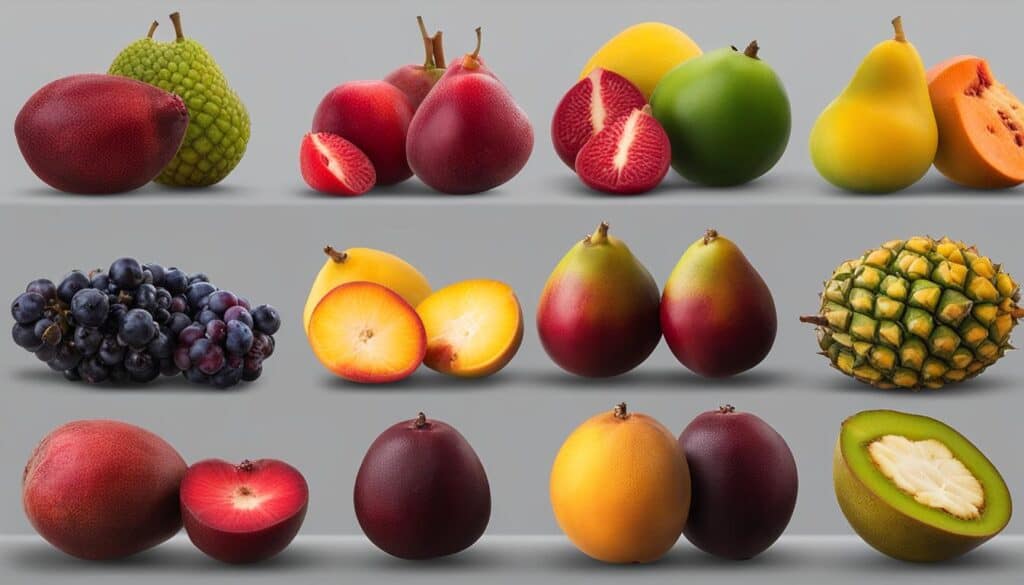
The Joy of Growing from Seeds
One of the most rewarding experiences for fruit enthusiasts is growing fruit trees from seeds. It not only allows you to nurture and witness the entire growth process but also gives you the opportunity to discover unique and delicious fruit varieties. Many users in our discussion have shared their joy and success in growing seedling fruit trees, and they emphasize the numerous benefits that come with this method.
“Growing fruit trees from seeds is truly a magical journey. It’s amazing to see how a tiny seed can transform into a beautiful tree bearing luscious fruit. Plus, you never know what surprises await you in terms of flavors and characteristics.” – Mary
One particular user, Lilian, is interested in growing peach trees from seeds. This is a great choice as peach trees are relatively easy to grow from seeds, and the process can be quite enjoyable. By planting peach tree seeds, Lilian can potentially discover a unique peach variety that perfectly suits her taste preferences.
Benefits of Growing Seedling Fruit Trees
There are several benefits to growing fruit trees from seeds:
- Cost-effective: Starting fruit trees from seeds is an economical option compared to buying grafted or mature trees.
- Adaptability: Seedlings tend to be more adaptable to local environmental conditions, making them more resilient and better suited to your specific region.
- Variety: By growing from seeds, you have the opportunity to discover and cultivate unique fruit varieties that may not be readily available commercially.
- Learning experience: Growing fruit trees from seeds allows you to deepen your understanding of the growth process and develop valuable gardening skills.
It’s important to note that seedling fruit trees may take longer to bear fruits compared to grafted trees. However, the joy of nurturing a tree from its humble beginnings and witnessing it thrive is truly gratifying.
If Lilian decides to grow peach trees from seeds, she can follow some simple steps to increase her chances of success. Here are some tips:
- Start with fresh, healthy peach seeds obtained from ripe fruit. Rinse the seeds and remove any pulp or residue.
- Place the seeds in damp paper towels or in a dampened seed-starting mix, and refrigerate them for about 8-12 weeks. This process, called cold stratification, simulates winter conditions and breaks the seed’s dormancy.
- After the cold stratification period, plant the seeds in well-draining soil, either in pots or directly in the ground.
- Water regularly to keep the soil moist but not waterlogged.
- Provide the seedlings with adequate sunlight.
- As the seedlings grow, thin them out, leaving only the strongest and healthiest plants.
- Be patient and give the seedlings time to develop into mature peach trees. It may take several years for them to bear fruit.
By following these steps, Lilian can embark on her own fruit-growing adventure and enjoy the satisfaction of nurturing her own peach tree from a seed.
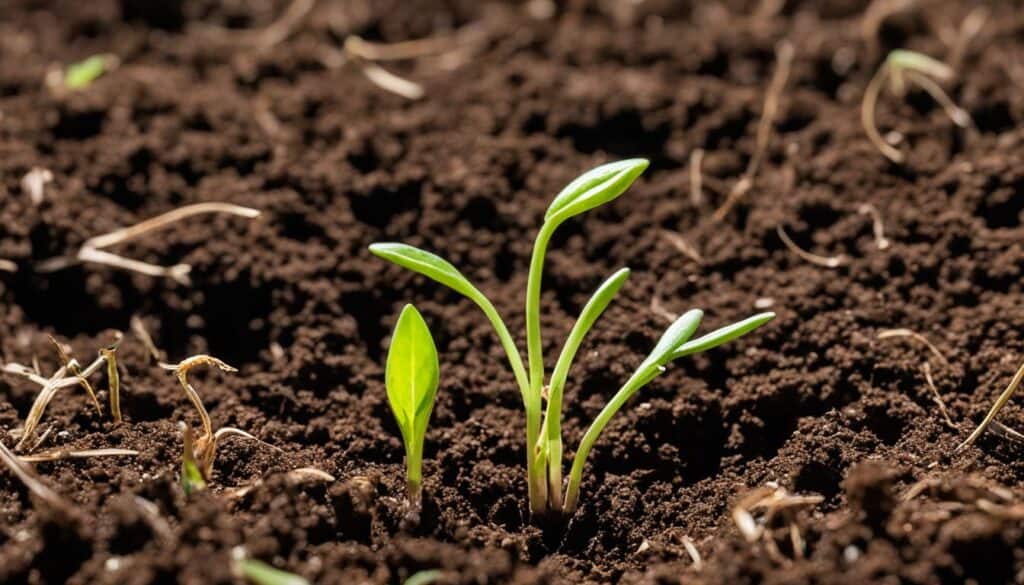
Image of a young peach tree grown from a seed. (Image source: Shutterstock)
Expert Tip
If Lilian wants to accelerate the fruiting process and obtain more predictable results in terms of fruit quality, she can consider grafting. Grafting involves joining a young seedling (rootstock) with a known peach variety (scion) to combine their desirable traits. However, grafting is not necessary for those who enjoy the surprises and unique characteristics that seedling trees offer.
| Pros of Growing from Seeds | Cons of Growing from Seeds |
|---|---|
| 1. Cost-effective | 1. Longer time to bear fruit |
| 2. Adaptable to local conditions | 2. Variability in fruit quality and characteristics |
| 3. Opportunity to discover unique varieties | |
| 4. A rewarding learning experience |
Tips for Growing Peach Trees from Seeds
Growing peach trees from seeds can be an exciting and rewarding experience. Here are some helpful tips shared by experienced gardeners to ensure successful growth:
- Cold stratification: Peach seeds require a period of cold stratification to break their dormancy and promote germination. Place the seeds in a moist paper towel or peat moss, seal it in a plastic bag, and refrigerate it for 8-12 weeks before planting.
- Cracking the stone: Another method to promote germination is to carefully crack the hard outer shell of the peach stone using a nutcracker or pliers. Be cautious not to damage the seed inside.
- Seed treatment for peaches: Soaking the seeds in water overnight can help soften the outer seed coat and improve germination rates.
- Grafting peach trees: While grafting is not necessary for seedling trees, some gardeners choose to graft desired cultivars onto established rootstocks for faster fruiting. Seek guidance from experienced grafters or local gardening groups for proper techniques.
- Growth hormone for grafting: Growth hormones, such as auxins, can be used when grafting peach trees to promote successful union between scion (desired cultivar) and rootstock. However, it is important to follow product instructions and use them cautiously.
Remember to provide the young peach seedlings with proper care, including adequate sunlight, well-draining soil, and regular watering. With patience and attention, you can enjoy the satisfaction of growing your own peach trees from seeds.
Here’s an inspiring quote from a seasoned gardener:
“Growing peach trees from seeds is a fascinating journey of discovery. Each tree bears the potential for unique characteristics and flavors, making it a truly exciting endeavor. Embrace the process, experiment with different techniques, and marvel at the wonders of nature unfolding before your eyes.”
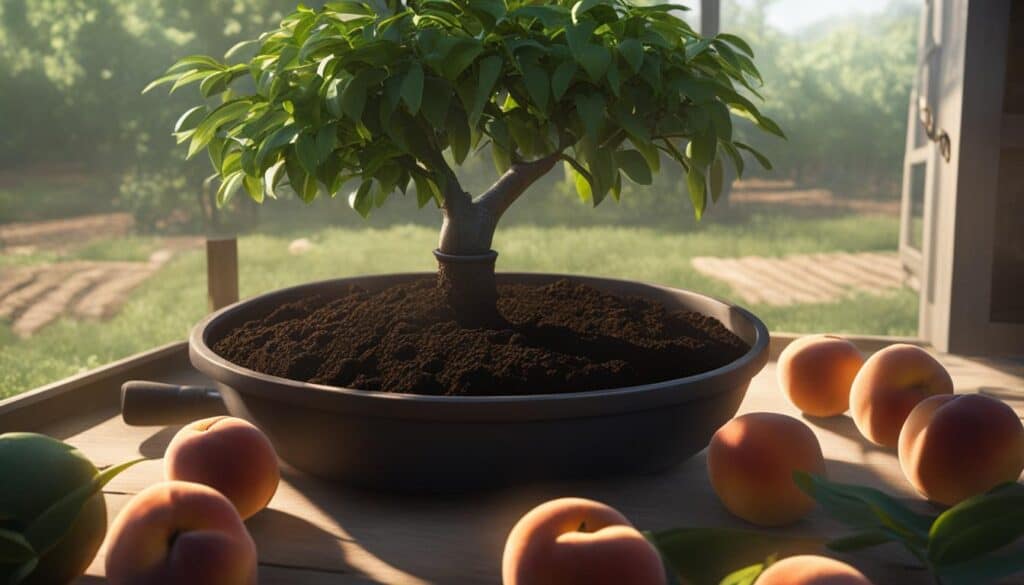
Next, let’s explore the search for the elusive Indian Blood Cling peach variety and its availability in Australia.
The Search for Indian Blood Cling Peach
Lilian shares her curiosity about finding the Indian Blood Cling peach variety. She mentions that she has seen this unique peach in Europe and the US but wonders if it is available in Australia or New Zealand under a different name. To help her in her quest, users suggest alternative names for this variety and discuss its availability in Australia.
While Lilian waits for more information, let’s take a look at some of the alternative names for peach varieties:
| Peach Variety | Alternative Names |
|---|---|
| Indian Blood Cling peach | Indian Blood peach |
| Red-fleshed peach | Crimson Gruntle |
| Yellow-fleshed peach | Sunshine Peach |
| White-fleshed peach | Snow Peach |
These are just a few examples of the alternative names for different peach varieties. It’s important to keep in mind that the availability of specific varieties may vary depending on the region and seasonal availability.
As Lilian continues her search for the Indian Blood Cling peach, we hope she finds the information she is looking for and can enjoy the deliciousness of this unique peach variety.
Freezing Excess Pears
When faced with an abundance of windfall pears, one of the best ways to preserve their freshness is by freezing them. Freezing allows you to enjoy the delicious taste of pears even when they are out of season, and it’s a simple process that anyone can do.
To prepare the pears for freezing, start by peeling, coring, and dicing them into small pieces. This will make it easier to use the frozen pears in various recipes later on.
Once the pears are prepared, you can choose to poach them in a light sugar syrup before freezing. Poaching the pears not only adds a touch of sweetness but also helps to maintain their texture and flavor.
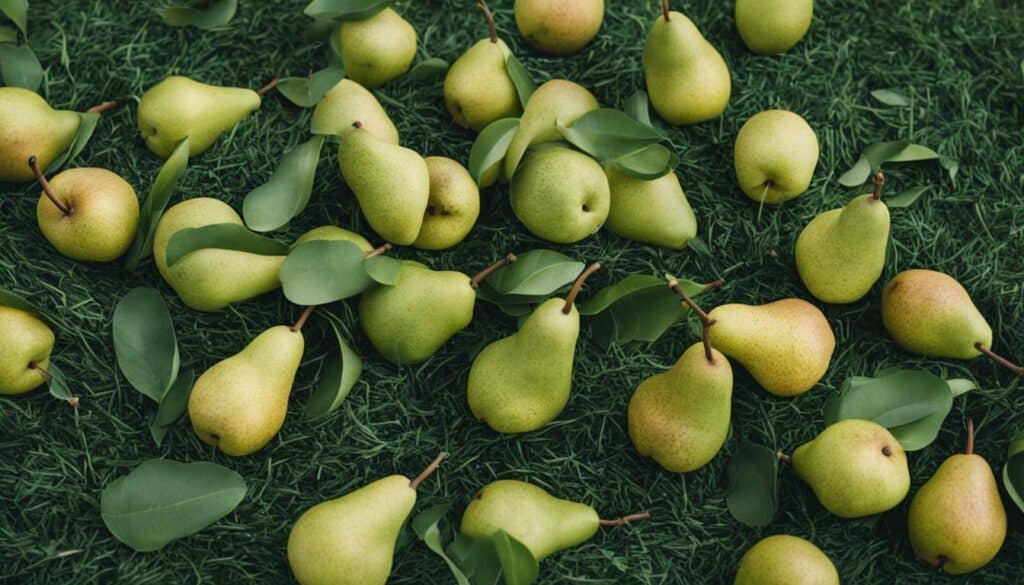
If you decide to poach the pears, simply place them in a saucepan with a mixture of water, sugar, and any desired flavorings such as vanilla or cinnamon. Gently simmer the pears in the syrup until they are tender, typically for about 15-20 minutes.
Once the pears are poached, allow them to cool before transferring them to a freezer-safe container or bag. Be sure to leave some headspace to account for expansion during freezing. Label the container with the date and type of pear to keep track of your frozen inventory.
When you’re ready to use the frozen pears, simply thaw them in the refrigerator overnight or defrost them in the microwave on a low power setting. These frozen pears can be used in a variety of recipes, such as pear pies, tarts, or even as a topping for pancakes or yogurt.
Don’t let those windfall pears go to waste. Freezing them is a great way to enjoy their sweetness all year round!
Conclusion
In conclusion, Yalca Fruit Trees is a reputable supplier of fruit trees in Yalca. With a wide variety of high-quality trees, they are a valuable resource for anyone interested in growing fruit trees in the area. Customers have praised their products and guidance, making them a trusted choice for fruit tree enthusiasts.
The article also sheds light on the challenge of finding rare fruit varieties in Australia. However, Yalca Fruit Trees stands out as a reliable supplier that offers diverse options for fruit tree enthusiasts. Whether you are looking for specific peach varieties or exploring the joy of growing fruit trees from seeds, Yalca Fruit Trees has the knowledge and expertise to assist you.
Additionally, the article provides useful tips for growing peach trees from seeds, allowing readers to try their hand at raising their own trees. This not only adds an element of excitement and uniqueness to the process but also offers the potential for discovering new and delicious fruit varieties.
Lastly, the article touches on the topic of preserving windfall pears. The author shares their method of poaching these pears and suggests various recipes for utilizing them. This highlights the practicality of growing fruit trees and the ability to enjoy the fruits of your labor in different culinary creations.
In summary, Yalca Fruit Trees is a reliable source for high-quality fruit trees in Yalca. The article’s exploration of rare fruit varieties, tips for growing peach trees from seeds, and suggestions for utilizing windfall pears demonstrate the breadth of knowledge and resources that Yalca Fruit Trees provides. Whether you’re a gardening enthusiast or a culinary explorer, Yalca Fruit Trees is an excellent choice for all your fruit tree needs.
FAQ
What fruit tree varieties does Yalca Fruit Trees offer in Yalca?
Yalca Fruit Trees offers a wide variety of fruit tree varieties, including peaches, pears, apples, cherries, plums, and many more.
Can Yalca Fruit Trees provide expert guidance on planting, care, and maintenance?
Yes, Yalca Fruit Trees is known for their expert guidance on planting, care, and maintenance of fruit trees. They can provide valuable tips and advice to ensure your trees thrive.
Where can I find a specific clingstone peach tree variety?
Yalca Fruit Trees may have the specific clingstone peach tree variety you are looking for. It is best to contact them directly to inquire about the availability of the variety you desire.
Are rare fruit varieties readily available from Yalca Fruit Trees?
Yalca Fruit Trees strives to offer a wide range of fruit tree varieties, including rare ones. However, the availability of rare varieties may vary, so it is recommended to check with them for specific requests.
Is it possible to grow peach trees from seeds?
Yes, it is possible to grow peach trees from seeds. Many people have successfully grown seedling peach trees, which can result in unique and delicious fruits.
What are some tips for successfully growing peach trees from seeds?
Some tips for growing peach trees from seeds include cold stratification, cracking the stone for germination, and providing adequate care and sunlight. Grafting with growth hormone is not necessary for seedling trees.
Can I find the Indian Blood Cling peach variety in Australia?
The Indian Blood Cling peach variety may be available in Australia under a different name. It is recommended to check with Yalca Fruit Trees or other local nurseries for alternative names and availability.
How can I preserve windfall pears?
To preserve windfall pears, you can peel, core, and dice them before poaching them in a light sugar syrup. The leftover poaching liquid can also be used as a syrup or glaze for other desserts.

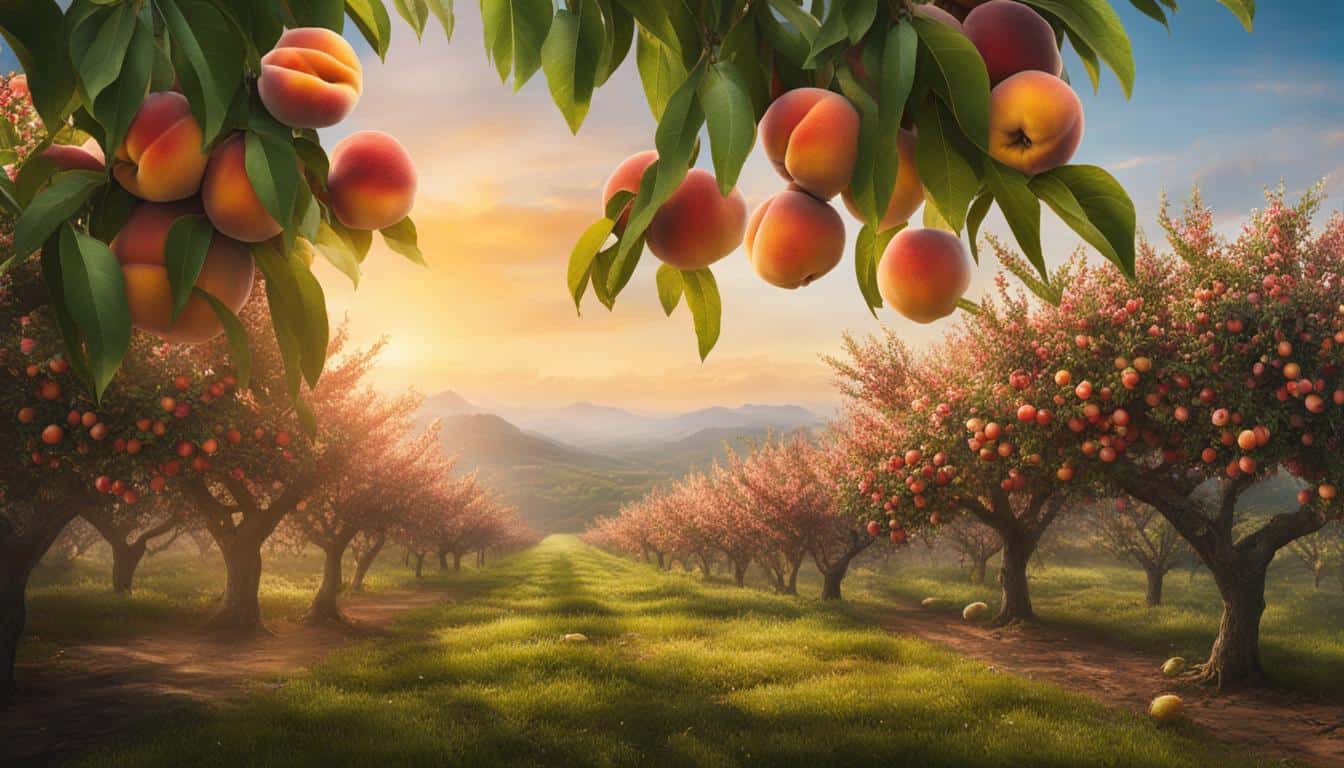



Leave a Reply